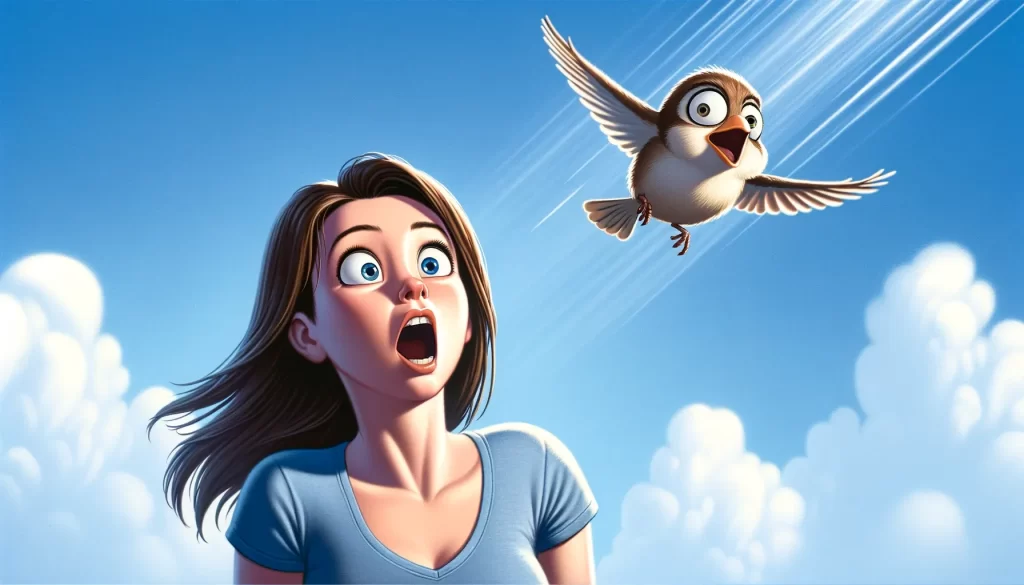Table of Contents
Discover the hilarious chaos as a Bird Is Just a Shot in My Sister Face. A tale of surprise, laughter, and sibling bonds. Get ready to laugh out loud! 😂📸
Key Takeaways
Unraveling the mystique behind a bird’s unexpected gesture offers diverse interpretations. Exploring cultural and superstitious nuances reveals varying beliefs about avian encounters. Navigating the aftermath of a bird’s unexpected visit demands tact and prudence. Personal narratives shed light on the unique perspectives surrounding bird droppings.
Deciphering the Occurrence: A Feathered Encounter on My Sister’s Visage
Decoding the meaning of a bird relieving itself on someone has been a long-standing superstition. Some consider it a fortuitous sign, while others perceive it as an ill omen.
In general, interpreting a bird’s deposit on an individual depends on cultural contexts and personal convictions. Nonetheless, it’s crucial to approach superstitions with a discerning mindset, acknowledging their lack of scientific grounding. Read more about Normas de Informacion Financiera.
Cultural Beliefs and Superstitions Encircling Avian Excrement
Throughout history, diverse cultures have attributed varied meanings to the phenomenon of birds anointing humans with their droppings. While some cultures celebrate it as a harbinger of good fortune, others dread it as a precursor to misfortune.
Many cultures believe that a bird’s droppings bring good luck, harking back to ancient times when such incidents were deemed messages from the divine. The quantity of droppings was thought to amplify the degree of luck.
Conversely, certain cultures perceive avian excrement as a harbinger of bad luck. In Japan, for instance, a bird’s deposit on one’s head is believed to bring misfortune for the entire day. Similarly, in Russia and Brazil, bird droppings are seen as omens of impending misluck.
Intriguingly, in some cultures, the color of the droppings matters. In India, a white drop is considered auspicious, while black or green ones are seen as signs of ill fortune.

Spiritual and Symbolic Dimensions of Avian Anointments
Beyond the surface inconvenience, a bird’s excretion holds profound spiritual and symbolic significance in various cultures. In spiritual realms, bird droppings are seen as messengers conveying crucial insights and guidance from the spirit world.
Some interpretations posit that a bird relieving itself on someone’s face symbolizes a need for purification. It may signify the release of negative energy, prompting individuals to let go of past experiences. Alternatively, it could indicate a call for grounding and a reconnection with the earth, urging individuals to stay rooted in the present.
Symbolically, bird droppings are linked to renewal and transformation. In some cultures, this occurrence is viewed as a positive omen, foretelling significant life changes. It may also signal the end of a challenging phase, paving the way for a fresh start.
Deciphering the symbolic and spiritual meanings necessitates an understanding of one’s belief system and personal experiences. It invites an open-minded exploration of the messages embedded in this peculiar encounter.
Debunking Myths and Legends Surrounding Avian Excreta
Bird droppings have woven themselves into the fabric of myths and legends, attempting to unravel the significance of a bird’s choice of target. From ancient tales to modern beliefs, people have crafted stories to explain the impact of a bird’s excretion.
| Myth/Legend | Explanation |
| Good Luck | Widely believed that being marked by a bird brings wealth, health, and joy. |
| Bad Luck | In certain cultures, a bird’s deposit is considered a harbinger of disaster or illness. |
| Message from the Gods | Ancient cultures perceived birds as divine messengers, interpreting their droppings as warnings or blessings. |
| Purification | Some Native American cultures view bird droppings as purifying, cleansing individuals of negative energy. |
| Humiliation | Certain societies consider being pooped on by a bird as embarrassing and degrading, especially in public settings. |
Despite the absence of scientific backing, these beliefs persist through generations, reflecting diverse cultural backgrounds.
Unraveling the Paradox: Why is Bird Poop Considered a Fortunate Omen?
Surprisingly, many people regard a bird’s excretion as a symbol of good luck. This seemingly counterintuitive superstition spans centuries and transcends cultures worldwide. But why is it deemed auspicious?
One interpretation suggests that bird droppings symbolize fertility and prosperity. The ammonia in the excrement is believed to possess cleansing properties, capable of dispelling negative energy and ushering in good fortune.
Another theory revolves around the rarity of the event. Since bird droppings are relatively uncommon, their occurrence is viewed as a unique and unexpected token of good luck. Additionally, encounters with birds are generally seen as positive omens, symbolizing freedom, joy, and spiritual growth.
However, it’s essential to recognize that the perception of bird droppings as a harbinger of good luck is not universal. In certain cultures, it signifies the opposite—an omen of misfortune. As with many superstitions, interpretation hinges on specific cultural contexts.
Grasping the Essence: The Significance of a Bird’s Offering
While a bird’s impromptu gift may appear arbitrary and inconvenient, numerous individuals attribute deep symbolic and spiritual significance to the experience. Interpretations range from good fortune and prosperity to forewarnings of impending doom.
In certain cultures, a bird’s deposit is seen as a sign of forthcoming success, abundance, or an indication of an upcoming event. Conversely, others perceive it as a cautionary sign, signaling potential misfortune or impending challenges.
From a spiritual standpoint, bird droppings are seen as messages from the universe, providing guidance or blessings. Some contend that the type and location of the droppings offer nuanced insights, with different birds and settings carrying distinct meanings.
Personal beliefs and encounters play pivotal roles in shaping individual perspectives. For some, it’s an inconvenience necessitating immediate cleanup; for others, it’s a unique and meaningful occurrence.
Personal Narratives: Anecdotes of Avian Annotations
Numerous individuals have shared their encounters with bird droppings, each narrative reflecting a unique perspective. For Sandra, a seagull’s unexpected visit became a good luck charm, leading to a romantic invitation. On the flip side, Rebecca experienced a less favorable episode at her sister’s wedding, where bird droppings were deemed an ill omen.
Individuals interpret bird poop incidents diversely—some find humor, and others perceive signs of luck or misfortune. Christina, preparing for a job interview, viewed the incident as a signal to relax, highlighting the varied reactions to this peculiar encounter.
Insights from Personal Journeys with Avian Annotations
Personal experiences with birds leaving their mark vary widely, rooted in cultural, spiritual, and individual interpretations. Acknowledging diverse beliefs, it’s crucial to approach such incidents with humor and an appreciation for life’s unexpected moments.
Ultimately, individuals decide how to interpret and respond to such encounters—whether with laughter, deeper contemplation, or a swift cleanup and onward journey.

Navigating the Fallout: Addressing the Aftermath of a Bird’s Artistry
If you or a loved one has encountered a bird’s artistic expression on their face, you’re well aware of the discomfort and embarrassment it entails. Addressing this situation requires prompt action to ensure cleanliness and mitigate potential health risks.
Primarily, cleaning the affected area promptly is crucial to prevent infections. Use a damp cloth or paper towel to gently remove the droppings, avoiding rubbing it into the skin. Harsh chemicals or hot water should be avoided, as they may exacerbate skin irritation.
After eliminating visible droppings, wash the affected area with soap and warm water. Thorough rinsing and gentle patting with a clean towel are essential. If the droppings reach the eyes, mouth, or nose, rinse with water for at least 15 minutes and seek medical attention if necessary.
Washing any clothing or items that came into contact with the droppings is equally important. Employ hot water and detergent to ensure comprehensive cleaning.
While bird droppings pose minimal harm to healthy individuals, they can harbor harmful bacteria, viruses, and parasites, especially if the bird is unwell. If symptoms such as fever, nausea, or diarrhea manifest after the incident, seeking medical attention is advisable.
Always wash hands thoroughly after handling bird droppings and refrain from touching the face or mouth. These precautions mitigate the risk of bacterial spread and facilitate a swift recovery from an unexpected avian encounter.
Dispelling Misconceptions: Safeguarding Health and Well-being
Although a bird’s artistic expression may seem innocuous, potential health and safety concerns warrant consideration.
Health Concerns of Bird Droppings on the Face
Bird droppings may carry harmful bacteria and viruses, including salmonella and E. coli. Contact with the eyes, mouth, or open wounds can pose infection risks. Additionally, certain birds may transmit diseases like histoplasmosis, causing respiratory issues if inhaled.
Safety Precautions After a Bird’s Artistic Gesture
In the event of a face-to-face encounter with bird droppings, adhering to safety precautions is paramount:
- Thorough Face Wash: Cleanse the face promptly with warm water and soap.
- Avoid Rubbing Eyes or Mouth: Refrain from rubbing sensitive areas to prevent further contamination.
- Address Open Wounds: Clean any open wounds immediately and apply antiseptic.
- Dispose of Contaminated Items: Eliminate clothing or towels that came into contact with the droppings.
- Monitor Health: If symptoms of illness or infection emerge, seek medical attention.
Certain individuals, such as young children, the elderly, or those with compromised immune systems, may be more susceptible to health risks associated with bird droppings. Extra precautions are advisable for individuals in these categories to minimize contact.
By embracing these safety measures, individuals can mitigate potential health risks linked to a bird’s spontaneous artistic expression.
Final Words
Exploring the myriad interpretations, beliefs, and meanings surrounding a bird’s artistic expression establishes its significant symbolic nature. Whether viewed as auspicious or ominous depends on cultural, spiritual, and personal perspectives.
From a personal viewpoint, the experience of a bird anointing my sister’s face was messy and inconvenient. However, delving into diverse interpretations and symbolic meanings reveals it as a message from nature or the universe—a call for growth, change, or introspection.
While dispelling common misconceptions regarding health and safety concerns, it’s crucial to approach this experience with an open mind. Whether perceived as a cosmic message, a stroke of luck, or merely an inconvenience, a bird’s artistic expression is a distinctive and individual encounter.



